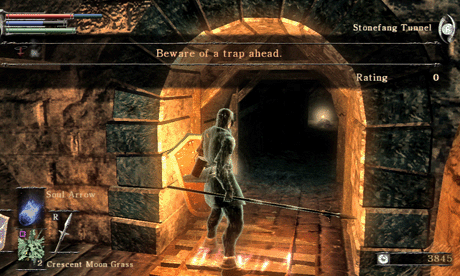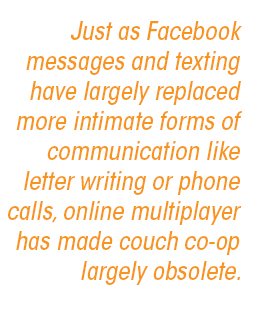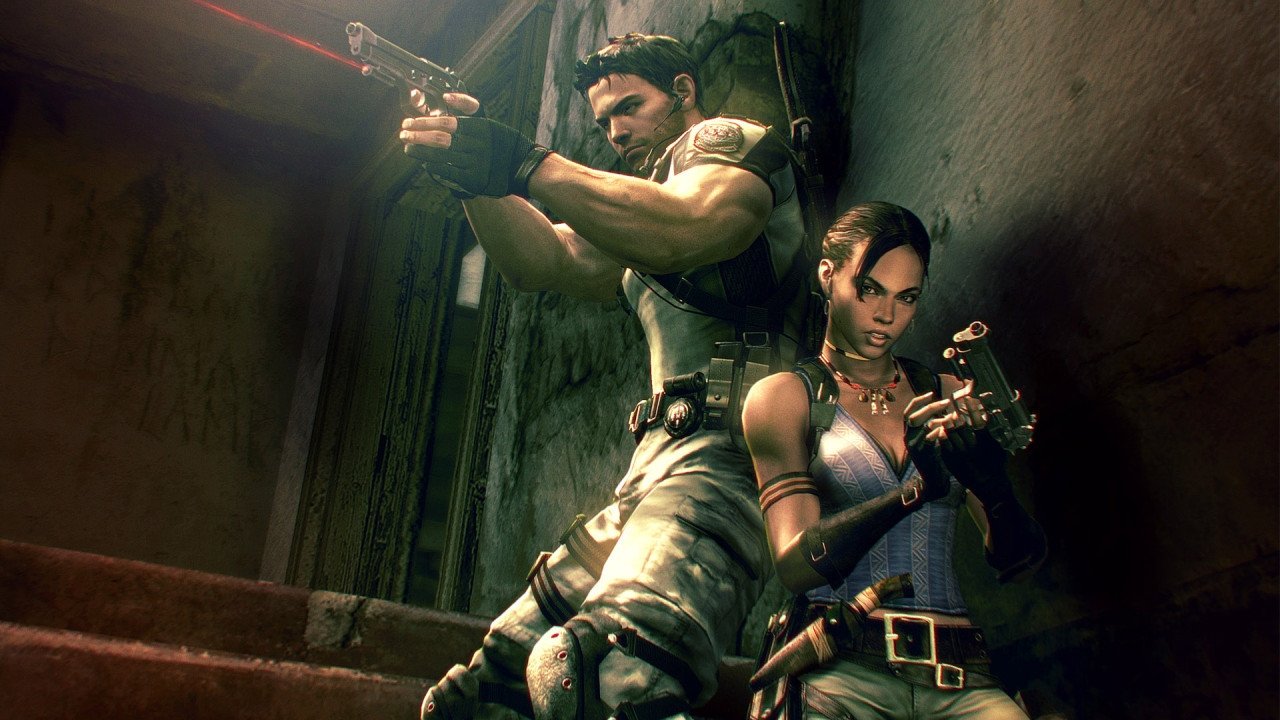This console generation has seen online gameplay firmly establish itself as a key feature of modern videogame design.
There’s a lot to love about this. Competitive multiplayer is easier for console owners to enjoy than ever before, leaderboards allow arcade-y titles to offer globalized high score chasing and consistent Internet connections make inventive mechanics like Dead/Dark Souls “messaging” system possible.
 Despite all of this good stuff, though, is one unfortunate side effect: the slow death of games featuring in-person cooperative (or “couch co-op”) play.
Despite all of this good stuff, though, is one unfortunate side effect: the slow death of games featuring in-person cooperative (or “couch co-op”) play.
I grew up in the 1990s and, not having consoles at home, experienced many of the first (non-PC) games I played during visits to my cousins on both sides of the family. My memories of childhood and pre-teen Thanksgiving and Christmas dinners are a mix of pick-up street hockey, watching movies and playing Super Nintendo or Genesis games like Teenage Mutant Ninja Turtles: Turtles in Time, Streets of Rage and Spider-Man and Venom: Maximum Carnage. The videogames we played, regardless of quality, always offered a pretty great experience. The lot of us would hook up two to four player co-operative games that let us experience media — and to overcome challenges — as a team. Instead of the passive nature of rewatching Hook or Batman for the zillionth time, we worked toward the end of whatever videogames were available by strategizing together, shouting at the screen together and, in to a degree, bonding with one another.
These kind of experiences are becoming harder and harder to come by.
 Playing co-op games didn’t create or define my relationships with friends and family, but it did offer something that is inherently more social than the remote, Bluetooth-enabled distance of modern co-op and multiplayer modes. The current landscape of cooperative play ties in with a larger trend, enabled by the proliferation of Internet connections, that sees different types of social interactions shifting to the digital sphere. Just as Facebook messages and texting have largely replaced more intimate forms of communication like letter writing or phone calls, online multiplayer has made couch co-op largely obsolete.
Playing co-op games didn’t create or define my relationships with friends and family, but it did offer something that is inherently more social than the remote, Bluetooth-enabled distance of modern co-op and multiplayer modes. The current landscape of cooperative play ties in with a larger trend, enabled by the proliferation of Internet connections, that sees different types of social interactions shifting to the digital sphere. Just as Facebook messages and texting have largely replaced more intimate forms of communication like letter writing or phone calls, online multiplayer has made couch co-op largely obsolete.
In some senses this is progress. Until the Xbox 360, PlayStation 3 and Wii launched, ready for players to hop online with painless wireless options, developers who wanted to encourage multiplayer had to design the old fashioned way — split screens and multiple controller inputs. Now, the same effect is possible with a single gamepad and a whole television screen to oneself. Sure, there are a lot of benefits to this approach, but, in the end, online co-op still removes too much of the human element to be truly gratifying (not to mention requiring multiple consoles/copies of the game in question).
The new paradigm firmly in place, it’s almost impossible to find quality videogames that come with couch co-op modes. I’ll buy the new Modern Warfare games just to get at their delicious split-screen Spec Ops missions and have revaluated a negative opinion of Resident Evil 5 (much maligned for its poorly handled AI “co-op” partner) by going through a second run with a friend, but quality cooperative titles like these are few and far between. I don’t expect this to change, but it doesn’t seem too much to hope that a kind of couch co-op niche could emerge in the future. Playing a single-player game through with a friend, passing a controller back and forth, lacks the same kind of fun that working together as a team does and people like myself — people who have already gone through the best modern co-op games available — are probably getting tired of contenting themselves with exhausting what is on offer (I’ve, sadly, played through both mediocre Army of Two games and purchased a copy of the thoroughly awful The Cursed Crusade fortheir offline co-op modes).
Audiences who love masochistic platformers or grind-heavy role-playing games get their niche fix from titles like Super Meat Boy and the Disgaea series. I can only hope that there’s enough of a demand for couch co-op games that some developers will pick up where mainstream games are starting to falter and help resurrect a style of play that’s all but disappearing.
***
Reid McCarter is a writer, editor and musician living and working in Toronto. He has written for sites and magazines including Kill Screen, The Escapist and C&G Magazine. He founded, writes and edits the videogame blog digitallovechild.com and is Twitter-ready @reidmccarter.




